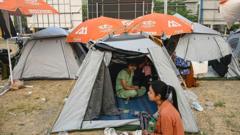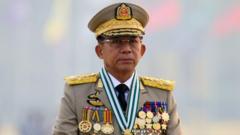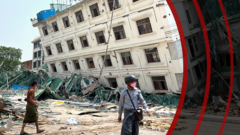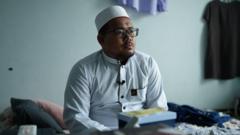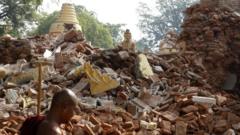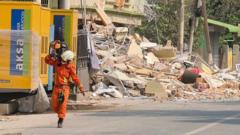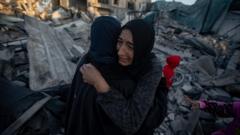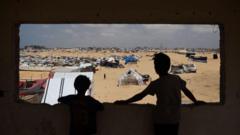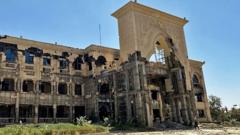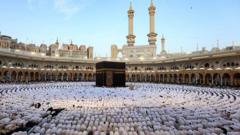The city of Khartoum stands in ruins following a fierce battle between Sudan's army and the RSF, leading to an end to RSF control. Amidst the destruction, Eid celebrations arise, symbolizing a complex mix of joy and trauma. Residents express hope for recovery, while grappling with the scars of war and questions about the future of democracy in Sudan.
Khartoum's Resilience: Echoes of War Amidst Eid Celebrations
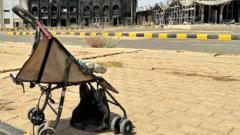
Khartoum's Resilience: Echoes of War Amidst Eid Celebrations
As Sudan's capital emerges from the grip of conflict, Khartoum's residents find solace in Eid celebrations, reflecting on loss, hope, and the daunting path to recovery.
The once-bustling streets of Khartoum lie largely deserted after weeks of brutal fighting as Sudan's army regained control from the paramilitary Rapid Support Forces (RSF). This shift marks a significant moment in a two-year civil war sparked by an internal power struggle, resulting in the loss of over 150,000 lives. In the aftermath, the city stands as a stark testament to destruction, yet Eid festivities punctuate this grim landscape, embodying both hope and resilience.
Walking through the devastated city, the emblematic presidential palace tells the story of the conflict. Once a cornerstone of Sudanese governance, it now lies stripped and battered. Soldiers, celebrating their hard-won victory during Eid, reflect a mix of pride and sorrow—emblems of dignity overshadowed by the heavy costs of war. "It is a symbol of our dignity," one soldier remarked as they navigated through shattered remains and reminders of a once-revered command center.
The havoc stretches across Khartoum, where government buildings and banks lay burnt to ashes, and the international airport resembles a battlefield filled with wreckage. As residents attempt to reclaim their lives, many find fleeting joy in the holiday atmosphere. "I feel like I've been re-created," one local, Osman al-Bashir, joyfully shared. For him and others, the freedom from RSF control has a profound emotional weight, even amidst food scarcity.
Eid represents a semblance of normalcy for residents who have endured two years of hardship. "We're celebrating for the first time in two years," exclaimed activist Duaa Tariq, amidst the overwhelming emotions from the long-suffered conflict. Yet, as they celebrate, they face daunting prospects—questions linger about the future of their nations, such as the fate of democratic transitions and civil rights that revolutionaries fought for years to achieve.
As small celebrations burgeon in pockets across the city, the psychological impact of the war remains palpable. Trauma lingers in the hearts of many, complicated by concerns for the future. “How will it be again for civil society, actors, for activists?” Tariq poignantly questioned, revealing the uncertainty that blankets the revival of Khartoum.
Excitement over the recovery of freedom carries an underlying tension for numerous families, many of whom have suffered unimaginable losses. “May God protect them," echoed a young girl, signaling a collective hope not only for themselves but for the broader region still engulfed in conflict. As Eid festivities unfold beneath the shadows of a war-torn city, the journey ahead for Khartoum remains fraught with challenges, but the indomitable spirit of its people offers a glimmer of hope for rebuilding and renewal.


